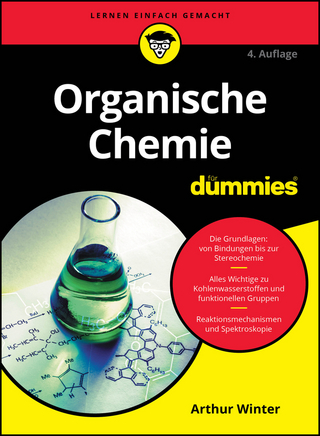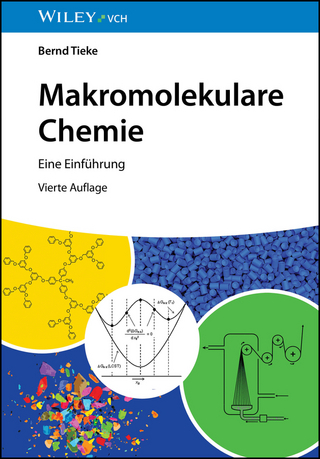Fundamentals of Polymer Science for Engineers
Wiley-VCH (Verlag)
978-3-527-34131-3 (ISBN)
Stoyko Fakirov is currently visiting professor in the Centre for Advanced Composite Materials at the University of Auckland, New Zealand. He studied chemistry at the University of Sofia, Bulgaria, and received his PhD from the Lomonossov State University in Moscow. Stoyko Fakirov is member of the editorial board of 12 international journals on polymers and advanced materials. He has published more than 300 peer-reviewed papers, edited or co-edited and always contributed to 15 books on polymer science and holds nine US patents.
PART I. INTRODUCTION
Chapter 1. Introduction
1.1 Milestones in the development of polymer science
1.2 Basic terms and definitions in polymer science
1.3 Bonding opportunities in chemistry.
PART II. PHYSICAL PROPERTIES OF POLYMERS
Chapter 2. Flexibility of polymer chains and its origin
2.1. Conformational stereoisomerism of macromolecules
2.2. Conformational statistics of chain models
2.3. Types of flexibility and its quantitative treatment
Chapter 3. Amorphous state of polymers
3.1. Characterization of state of matter
3.2. State of matter and phase transitions of condensed substances. Glass transition
3.3. Deformation of polymers. Three deformational (relaxational) states of polymers
3.4. Relaxation phenomena
3.5. Glassy state of polymers
3.6. High elastic state of polymers
3.7. Viscous-liquid state of polymers
3.8. Mechanical models of linear polymers
3.9. Structure and morphology of amorphous polymers, polymer melts and solutions
3.10. Liquid-crystalline polymers
Chapter 4. Crystalline polymers
4.1. Peculiarities of crystalline polymers. Degree of crystallinity
4.2. Prerequisites for polymer crystallization
4.3. Kinetic and mechanisms of crystallization
4.4. Growth of nuclei (crystals)
4.5. Total crystallization rate
4.6. Melting and recrystallization
4.7. Morphology and molecular structure of crystalline polymers
Chapter 5. Mechanics of polymers
5.1. Basic terms and definitions
5.2. Nature of neck formation
5.3. Strength of polymers and long-term strength
5.4. Polymer failure ? mechanism and theories
Chapter 6. Polymer solutions
6.1. Development of ideas regarding the nature of polymer solutions
6.2. Thermodynamics of polymer solutions
6.3. Flory ? Huggins theory
6.4. Concentrated polymer solutions. Plasticizing
Chapter 7. Polymer molecular weights
7.1. Types of molecular weights
7.2. Polydispersity and molecular weight distribution
7.3. Methods for determination of weight and sizes of macromolecules
Chapter 8. Methods for characterization and investigation of polymers
8.1. Diffraction methods
8.2. Microscopic methods.
8.3. Thermal methods
8.4. Spectroscopic techniques for investigation of polymer structure and conformational studies of macromolecules
8. 5. Static and dynamic mechanical techniques
PART III. SYNTHESIS OF POLYMERS
Chapter 9. Polycondensation (condensation polymerization)
9.1. Introduction
9.2. Equilibrium polycondensation
9.3. Non-equilibrium polycondensation
9.4. Polycondensation in three dimensions
Chapter 10. Chain polymerization
10.1. Introduction
10.2. Radical polymerization
10.3Radical copolymerization
10.4 Ionic polymerization
Chapter 11. Synthesis of polymers with special molecular arrangements
11.1 Block and graft copolymers
11.2Graft copolymers
11.3. Stereoregular polymers
Chapter 12. Chemical reactions with macromolecules. New non-traditional methods for polymer synthesis
12.1. Introduction
12.2. Polymer-analogous reactions
12.3. Polymer destruction
12.4. New non-traditional methods for polymer synthesis
PART IV. POLYMER MATERIALS AND THEIR PROCESSING
Chapter 13. Polymer materials and their processing
13.1. Introduction
13.2. Fibers
13.3. Elastomers
13.4. Polymer blends
13.5. Films and sheets
13.6. Polymer composites
13.7. Nanomaterials and polymer nanocomposites
13.8. Basic problems in polymer science and technology: environmental impact, interfacial adhesion quality, aspect ratio
13.9. Polymer?polymer and single polymer composites: definitions, nomenclature, advantages and disadvantages
13.10. Processing of fiber-reinforced composites
13.11. Fabrication of shaped objects from polymers
Chapter 14. Polymers for special applications
14.1. Electrically conductive polymers
14.2. High-performance thermoplastics
14.3. Polymers for Hydrogen storage
14.4. Smart materials
14.5. Uses for polymers in biomedicine
14.6. Tissue engineering
14.7. Controlled release of drugs
| Erscheinungsdatum | 20.09.2017 |
|---|---|
| Verlagsort | Berlin |
| Sprache | englisch |
| Maße | 170 x 244 mm |
| Gewicht | 898 g |
| Themenwelt | Naturwissenschaften ► Chemie ► Organische Chemie |
| Technik ► Maschinenbau | |
| Schlagworte | chemical engineering • Chemische Verfahrenstechnik • materials characterization • Materials Science • Materialwissenschaften • Particle Technology & Product Design • Particle Technology & Product Design • Partikeltechnik u. Produktentwicklung • Polymerchemie • Polymere • Polymer Science & Technology • Polymer Science & Technology • Polymersynthese • polymer synthesis • Polymerwissenschaft u. -technologie • Werkstoffprüfung |
| ISBN-10 | 3-527-34131-5 / 3527341315 |
| ISBN-13 | 978-3-527-34131-3 / 9783527341313 |
| Zustand | Neuware |
| Haben Sie eine Frage zum Produkt? |
aus dem Bereich




